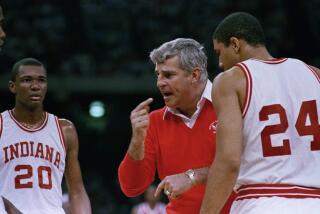Arthur Knight; Film Scholar, Teacher
- Share via
Arthur Knight, teacher, critic and film scholar whose views on censorship and sex in cinema were widely sought in courtrooms throughout the nation, has died.
Friends and former colleagues said over the weekend that Knight died Thursday in his sleep at his home in Sydney, Australia, of an apparent heart attack. He was 74 and had moved to Australia after suffering a heart attack several years ago.
Affable and witty with a macabre sense of humor, Knight was a traditionalist when it came to films. In critiquing films for 25 years for the Saturday Review and later for Playboy, Knight found little that compared to the putative Golden Age of Hollywood.
Students in his classes at USC included such future film giants as George Lucas, John Carpenter and John Milius, and the guest lecturers he brought before them provided a living link to things cinematic: Frank Capra, Lina Wertmuller, Orson Welles, Alfred Hitchcock, Clint Eastwood and Jerry Lewis.
He liked to say that during his 25 years (1960-85) at USC, hardly a week went by without a call from a former student who had just produced, directed, written, edited or photographed his first feature.
Knight’s timeless “The Liveliest Art,” a popular history of the cinema first published in 1957, has become a widely used textbook across the country.
Daily Variety, the entertainment publication, quoted Elizabeth Monk Daley, dean of the USC School of Cinema-Television, as saying that Knight “was an integral part of the film education of several generations. . . .”
Born Arthur Rosenheimer in Philadelphia, Knight joined the Museum of Modern Art in 1939 as assistant film curator after graduation from City College of New York. He returned to the museum after Army service in World War II, where he was wounded in action after the 1944 invasion of France.
He wrote for Saturday Review and Westways while teaching at USC and served as a selection director for Filmex in Los Angeles and the New York Film Festival. Despite his often-expressed misgivings about contemporary films, he found them preferable to live drama.
“A bad movie is infinitely more watchable than a bad play, simply because there is so much more going on.”
While teaching his “Introduction to Film” course at USC--one of the most popular at the school because of Knight’s self-effacing, wry humor--he also had a syndicated radio series and was film coordinator for such TV series as “Omnibus,” “Odyssey” and “The Seven Lively Arts.”
He opposed censorship at all levels, and with Hollis Alpert wrote Playboy’s “Sex in Cinema” series from 1965 to 1973, and then by himself until 1985. That year he also became host and writer of the Playboy Channel’s “Sex in Cinema” series. From those experiences came his appearances as an expert witness in censorship cases.
As Knight aged, he continued to look back on the pictures of his youth with wistful regret.
“Even a run-of-De-Mille production,” he once punned, was preferable to the films produced today by “former lawyers, accountants, agents or TV executives (who) rarely go to the movies themselves, unless it be for a sneak preview of one of their releases.”
More to Read
Only good movies
Get the Indie Focus newsletter, Mark Olsen's weekly guide to the world of cinema.
You may occasionally receive promotional content from the Los Angeles Times.










